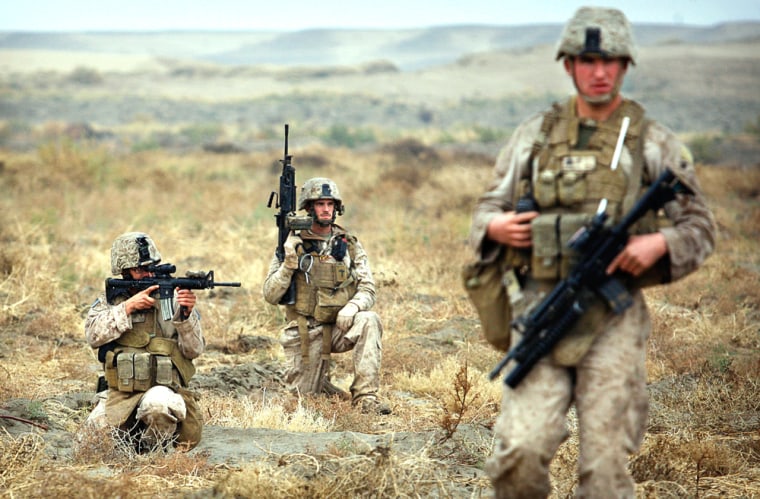Americans like seeing President Barack Obama finally tackle Afghanistan — even if most don't support his plans.
The latest Associated Press-GfK poll shows the president's marks for handling the 8-year-old war have jumped by double digits — more than half now approve — since he capped a three-month strategy review by announcing a big troop increase. He said he would boost U.S. forces in Afghanistan to 100,000 — and begin bringing them home in July 2011.
But despite his prime-time TV speech explaining how he reached his decision, there was no change in the public's resistance to escalation. Just 42 percent favor sending more troops while 56 percent oppose it, essentially unchanged from November.
The findings suggest limits to Obama's persuasive skills — and underscore what's seemingly become the public's default position in his first year in office: People like him, but they're squeamish about his policy.
"These were tough decisions this guy had to make," said Steve Pollaro, 67, a bus driver from Torrance, Calif., praising Obama for showing leadership. But Pollaro — a registered Republican who calls himself a recent Democratic convert — is lukewarm at best on the new strategy itself. He opposes a public timeline for beginning a withdrawal and reluctantly backs the troop increase — on grounds that Obama knows more than he does.
Against escalation
Others, like Democrat Scott Hanson, 30, a state employee from Duluth, Minn., give Obama a thumbs-up for leading on Afghanistan but are absolutely against the escalation. Said Hanson: "I just don't feel that threatened, so I don't think we really need 30,000 more troops."
And there still are a large number of people he feel just the opposite. Take independent Larry Sass, 62, a UPS store manager from East Hartford, Conn., who says: "It's good he sent the troops, but he took too long to do it and I wish he would show more backbone."
Overall, most people — and most of Obama's fellow Democrats — don't think Afghanistan is a conflict worth fighting. But Obama is pressing ahead despite such polling. He told CBS' "60 Minutes" that he ordered more troops "because I think it's the right thing to do. And that's my job. If I was worried about what polled well, there are a whole bunch of things we wouldn't have done this year."
The poll respondents' conflicting viewpoints reflect the complexity of the issues surrounding Afghanistan and underscore the challenge the novice commander in chief faces as he seeks to persuade a skeptical Congress to continue paying for war and an impatient public to stick with him heading into his first midterm congressional election year.
In some good news for Obama, a chunk more people said the country is heading in the right direction, 46 percent compared with just 38 percent last month. And the increase is evident among Republicans, Democrats and independents.
Obama approval holds
The president's overall job-approval rating essentially held steady at 56 percent — even though the health care overhaul hasn't been completed, the fate of much-desired legislation curbing climate change is uncertain, and the unemployment rate remains at 10 percent while budget deficits rise to record levels.
Half the country still says the nation is on the wrong track, and 42 percent don't approve of how Obama is governing. Those results could prove problematic for a White House looking to advance an ambitious agenda next year and to Democrats seeking to retain their control of the House and Senate. Congress' marks remain low, with only a third of the country approving of how it's doing and two-thirds disapproving.
Although the national debate over health care has been heated, there was little to no change from November in the public's attitudes on the proposals being discussed — 44 percent oppose them while 36 percent support them. And only half the country approves of Obama's handling of the issue.
Afghan war still unpopular
The greatest shifts over the past month came on Afghanistan.
Since November, the president has completed a lengthy review of his Afghanistan policy and announced he will nearly triple the force he inherited in the country, at a cost of $30 billion for the first year alone. He mapped out the strategy and explained his decision in a prime-time speech at the U.S. Military Academy. He said a drawdown would begin in 18 months, but he set no target date for ending the war.
Obama's approval rating on Afghanistan stands at 52 percent — up a whopping 10 percentage points from November — while the percentage of those who disapprove dropped to 40 percent from 48 percent. Obama has improved his standing among members of both major political parties; 70 percent of Democrats and 39 percent of Republicans now approve of his handling of Afghanistan, increases of nine and 19 points, respectively, from last month.
Even so, only 39 percent of Americans overall favor the Afghanistan war, while 57 percent oppose it — roughly unchanged over the past six months.
The AP-GfK Poll was conducted Dec. 10-14 by GfK Roper Public Affairs and Media. It involved landline and cell phone interviews of 1,001 adults nationwide, and it has a margin of sampling error of plus or minus 3.1 percentage points.
